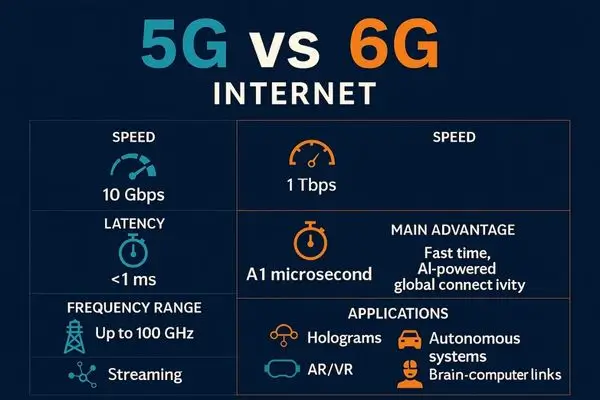How exactly will 5G vs 6G internet compare? In just a few years, our world has leaped from 4G LTE to 5G—and now, the tech industry is already preparing for the next giant leap: 6G internet.
While 5G is still in the process of global rollout, researchers and telecom giants are working behind the scenes to shape 6G into a network so advanced that it could redefine how humans interact with technology.
Topics
Table of Contents
Is 6G better than 5G?
And where does WiFi 6 fit into the conversation?
Let’s dive deep with hstech.io into these next-gen technologies.
1. What is 5G Internet?
5G is the fifth generation of mobile network technology. Launched commercially in 2019, it offers:
- Speed: 100 Mbps to 10 Gbps (depending on location and infrastructure)
- Latency: As low as 1 millisecond (compared to ~50 ms on 4G)
- Technology: Uses millimeter waves and sub-6 GHz spectrum for high-capacity data transfer.
Key Advantages of 5G:
- Faster downloads & streaming without buffering.
- Supports smart cities and massive IoT devices.
- Enables AR/VR applications with low latency.
Current Status:
As of 2025, 5G is available in most urban areas in developed nations, but rural coverage still relies on 4G or hybrid networks.
See Also: Windows 2030: Microsoft’s Bold Leap into an AI-First
2. What is 6G Internet?
6G is the sixth generation of mobile network technology, currently under research, with a targeted commercial launch around 2030.

Predicted Features:
- Speed: Up to 1 Tbps (that’s 100 times faster than 5G).
- Latency: Almost zero—measured in microseconds.
- Frequencies: Terahertz (THz) bands for extreme data capacity.
- Integration: Deep AI and machine learning control for real-time optimization.
Applications:
- Holographic communication
- Brain-computer interfaces
- Autonomous vehicle coordination
- Extended reality (XR)
In essence, 6G internet aims to make real-time global interaction as smooth as talking face-to-face, without cables, delays, or interruptions.
3. 5G vs WiFi 6 – Which is Faster?
| Feature | 5G | WiFi 6 |
|---|---|---|
| Max Speed | ~10 Gbps | ~9.6 Gbps |
| Latency | 1 ms | 1–2 ms |
| Coverage | Wide (cellular towers) | Local (router range) |
| Best Use | Mobile devices, IoT networks | Home/office internet |
Feature 5G WiFi 6
Max Speed ~10 Gbps ~9.6 Gbps
Latency 1 ms 1–2 ms
Coverage Wide (cellular towers) Local (router range)
Best Use: Mobile devices, IoT networks, Home/office internet
Verdict:
In ideal conditions, 5G can be slightly faster than WiFi 6, but WiFi 6 is more stable for indoor use. In the future, WiFi 7 and 6G internet may work together seamlessly.
4. 5G vs 6G Internet – Key Differences
| Feature | 5G | 6G (Predicted) |
|---|---|---|
| Max Speed | 10 Gbps | 1 Tbps |
| Latency | 1 ms | < 1 microsecond |
| Frequency Range | Up to 100 GHz | Up to 3 THz |
| Main Advantage | Fast mobile broadband | Real-time, AI-powered global connectivity |
| Applications | IoT, AR/VR, streaming | Holograms, autonomous systems, brain-computer links |
Feature 5G 6G (Predicted)
Max Speed 10 Gbps 1 Tbps
Latency 1 ms < 1 microsecond
Frequency Range Up to 100 GHz Up to 3 THz
Main Advantage: Fast mobile broadband, Real-time, AI-powered global connectivity
Applications: IoT, AR/VR, streaming Holograms, autonomous systems, brain-computer links
5. Disadvantages of 6G Internet
While 6G sounds like a tech dream, it comes with challenges:
- Infrastructure Costs – New towers, satellites, and THz technology will be extremely expensive to deploy.
- Limited Coverage Initially – Like 5G, 6G will first launch in urban areas only.
- Energy Consumption – Early 6G networks may consume huge amounts of energy before optimization.
- Security Risks – Faster speeds mean cyberattacks could happen faster, too.
- Technology Dependence – Could make people and industries overly reliant on AI-driven connectivity.

6. Is 6G Better Than 5G?
Yes—on paper, 6G internet outperforms 5G in almost every metric:
- Faster speeds by a factor of 100.
- Ultra-low latency.
- Broader device-to-device communication.
- Greater AI integration.
However, 5G will remain dominant for several years after 6G launches, especially in areas where upgrading infrastructure isn’t cost-effective.
See also: 10 Best AI Courses to Kickstart Your Journey: A Beginner-Friendly Guide
7. The Future Beyond – 7G Internet
While 6G is still under development, research on 7G has already begun in early experimental phases.
Potential Features of 7G Internet:
- Space-based internet from satellites orbiting Mars and the Moon.
- Speeds exceeding 10 Tbps.
- Integration with quantum computing for unbreakable security.
- 100% coverage, including oceans and remote islands.
If 6G is a revolution, 7G could be the age of universal, instant communication across planets.
8. Final Thoughts – 5G vs 6G Internet
The 5G vs 6G internet debate isn’t just about speed—it’s about the future of connectivity, AI, and human interaction.
- 5G is here and already changing how we use mobile networks.
- 6G is coming, and it will transform industries, governments, and daily life.
- The future may even combine 6G mobile + WiFi 7 home internet for seamless connectivity everywhere.
The bottom line: The transition from 5G to 6G internet will be one of the most exciting technological shifts in history—and we’re only at the beginning.
Pro Tip for Businesses: If your industry relies on communication, data analytics, or IoT, start preparing now for 6G. The companies that adapt early will lead the next digital era.
sfqgny